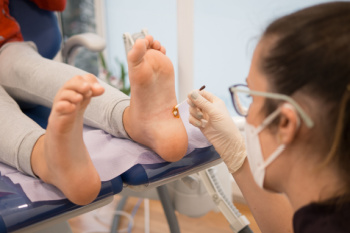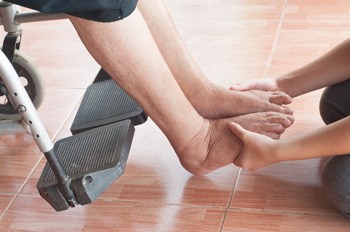Connect With Us
Blog
 Plantar warts are caused by the human papillomavirus, or HPV, infecting the skin on the bottom of the feet. These highly contagious warts can be both uncomfortable and persistent. Treatment options vary and may include remedies like salicylic acid, which gradually peels away the wart. A podiatrist, or foot doctor, may suggest more advanced solutions for warts that are more resistant to treatment. Some possible treatments include cryotherapy, which uses liquid nitrogen to freeze and kill the wart tissue, or laser treatment, which destroys the wart with focused light energy. In some cases, minor surgical removal may be necessary, especially for deeper or more stubborn warts. Podiatrists can also provide guidance on preventing the spread of the virus and managing discomfort during the treatment process. If you are struggling with plantar warts, it is suggested that you make an appointment with a podiatrist to discuss treatment options.
Plantar warts are caused by the human papillomavirus, or HPV, infecting the skin on the bottom of the feet. These highly contagious warts can be both uncomfortable and persistent. Treatment options vary and may include remedies like salicylic acid, which gradually peels away the wart. A podiatrist, or foot doctor, may suggest more advanced solutions for warts that are more resistant to treatment. Some possible treatments include cryotherapy, which uses liquid nitrogen to freeze and kill the wart tissue, or laser treatment, which destroys the wart with focused light energy. In some cases, minor surgical removal may be necessary, especially for deeper or more stubborn warts. Podiatrists can also provide guidance on preventing the spread of the virus and managing discomfort during the treatment process. If you are struggling with plantar warts, it is suggested that you make an appointment with a podiatrist to discuss treatment options.
Plantar warts can be very uncomfortable. If you need your feet checked, contact Pedram Aslmand, DPM from Advanced Foot and Ankle Center. Our podiatrist will assist you with all of your foot and ankle needs.
About Plantar Warts
Plantar warts are the result of HPV, or human papillomavirus, getting into open wounds on the feet. They are mostly found on the heels or balls of the feet.
While plantar warts are generally harmless, those experiencing excessive pain or those suffering from diabetes or a compromised immune system require immediate medical care. Plantar warts are easily diagnosed, usually through scraping off a bit of rough skin or by getting a biopsy.
Symptoms
- Lesions on the bottom of your feet, usually rough and grainy
- Hard or thick callused spots
- Wart seeds, which are small clotted blood vessels that look like little black spots
- Pain, discomfort, or tenderness of your feet when walking or standing
Treatment
- Freezing
- Electric tool removal
- Laser Treatment
- Topical Creams (prescription only)
- Over-the-counter medications
To help prevent developing plantar warts, avoid walking barefoot over abrasive surfaces that can cause cuts or wounds for HPV to get into. Avoiding direct contact with other warts, as well as not picking or rubbing existing warts, can help prevent the further spread of plantar warts. However, if you think you have developed plantar warts, speak to your podiatrist. He or she can diagnose the warts on your feet and recommend the appropriate treatment options.
If you have any questions please feel free to contact our offices located in Long Beach, CA . We offer the newest diagnostic and treatment technologies for all your foot and ankle needs.

Elderly foot care is imperative due to the profound impact feet have on overall well-being. As the foundation of mobility, feet endure a lifetime of stress and strain, making them vulnerable to age-related changes and conditions. With advancing age, the body undergoes physiological changes, such as decreased skin elasticity and reduced water content in cells, which can contribute to common foot problems like dryness, calluses, and fungal infections. Additionally, structural changes, such as loss of fat padding and decreased circulation, can increase the risk of foot pain, ulcers, and injuries. Regular foot examinations by a podiatrist are essential for seniors to detect and address issues early, preventing complications and maintaining mobility and quality of life. If you are a senior, it is suggested that you schedule routine visits with a podiatrist for guidance and treatment specialized for aging feet.
Proper foot care is something many older adults forget to consider. If you have any concerns about your feet and ankles, contact Pedram Aslmand, DPM from Advanced Foot and Ankle Center. Our podiatrist can provide the care you need to keep you pain-free and on your feet.
The Elderly and Their Feet
As we age we start to notice many changes in our body, but the elder population may not notice them right away. Medical conditions may prevent the elderly to take notice of their foot health right away. Poor vision is a lead contributor to not taking action for the elderly.
Common Conditions
- Neuropathy – can reduce feeling in the feet and can hide many life-threatening medical conditions.
- Reduced flexibility – prevents the ability of proper toenail trimming, and foot cleaning. If left untreated, it may lead to further medical issues.
- Foot sores – amongst the older population can be serious before they are discovered. Some of the problematic conditions they may face are:
- Gouging toenails affecting nearby toe
- Shoes that don’t fit properly
- Pressure sores
- Loss of circulation in legs & feet
- Edema & swelling of feet and ankles
Susceptible Infections
Diabetes and poor circulation can cause general loss of sensitivity over the years, turning a simple cut into a serious issue.
If you have any questions please feel free to contact our offices located in Long Beach, CA . We offer the newest diagnostic and treatment technologies for all your foot and ankle needs.

Sever's disease, also known as calcaneal apophysitis, is a common condition affecting children, particularly active adolescents during growth spurts. It occurs when the growth plate at the back of the heel becomes inflamed due to repetitive stress or overuse. This is often worsened by activities like running, jumping, or participating in sports. Diagnosis typically involves a physical examination by a podiatrist, focusing on tenderness and swelling around the heel. X-rays may also be used to rule out other potential causes of heel pain. Treatment may include recommendations for activity modification, custom-made orthotic devices to support the foot and reduce strain on the heel, stretching and strengthening exercises, and footwear guidance. In severe cases, additional interventions such as immobilization with a cast may be necessary. If your child is complaining about heel pain or you notice they are limping, it is strongly suggested that you schedule an appointment with a podiatrist for a proper diagnosis and treatment.
Sever's disease often occurs in children and teens. If your child is experiencing foot or ankle pain, see Pedram Aslmand, DPM from Advanced Foot and Ankle Center. Our podiatrist can treat your child’s foot and ankle needs.
Sever’s Disease
Sever’s disease is also known as calcaneal apophysitis, which is a medical condition that causes heel pain I none or both feet. The disease is known to affect children between the ages of 8 and 14.
Sever’s disease occurs when part of the child’s heel known as the growth plate (calcaneal epiphysis) is attached to the Achilles tendon. This area can suffer injury when the muscles and tendons of the growing foot do not keep pace with bone growth. Therefore, the constant pain which one experiences at the back of the heel will make the child unable to put any weight on the heel. The child is then forced to walk on their toes.
Symptoms
Acute pain – Pain associated with Sever’s disease is usually felt in the heel when the child engages in physical activity such as walking, jumping and or running.
Highly active – Children who are very active are among the most susceptible in experiencing Sever’s disease, because of the stress and tension placed on their feet.
If you have any questions, please feel free to contact our offices located in Long Beach, CA . We offer the newest diagnostic and treatment technologies for all your foot and ankle injuries.

